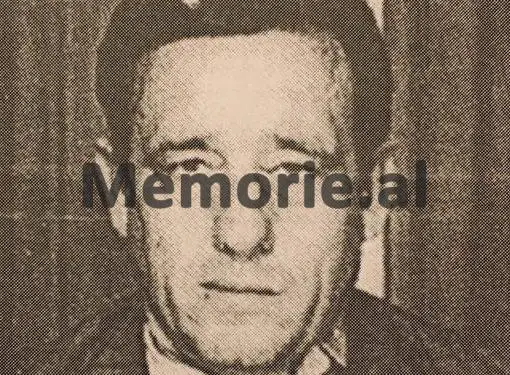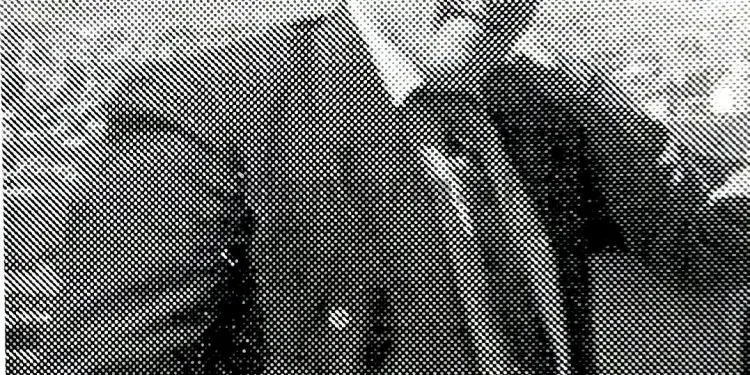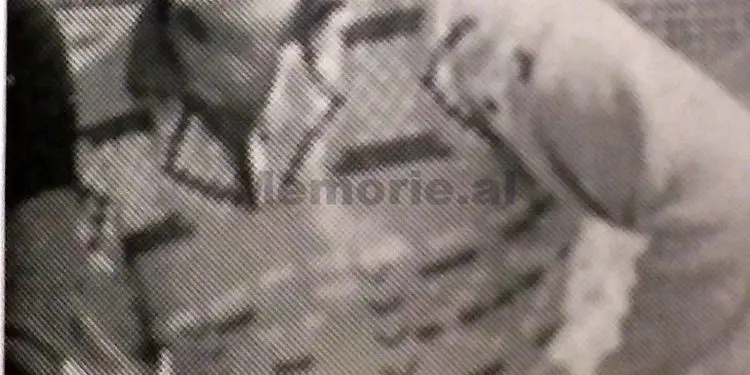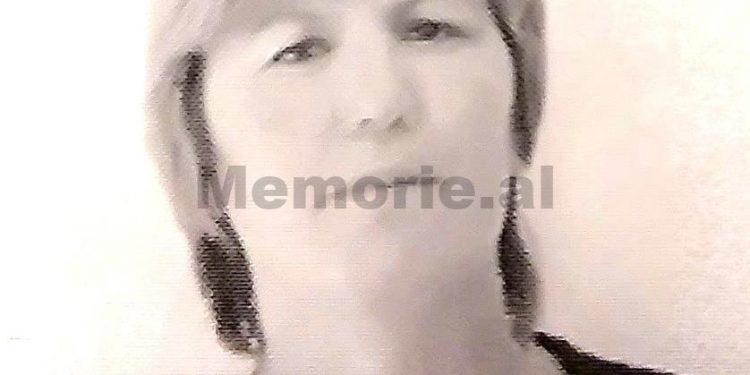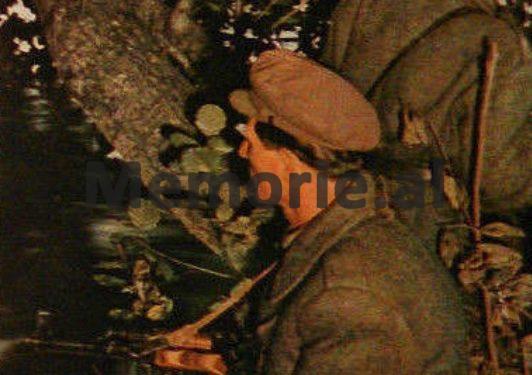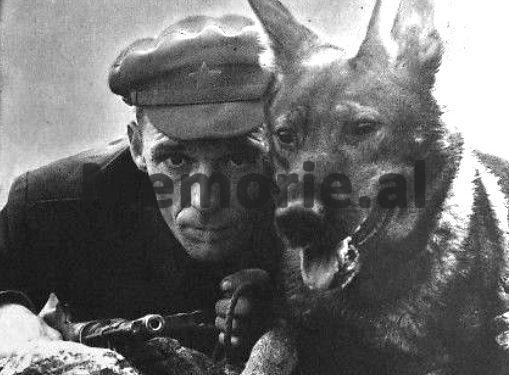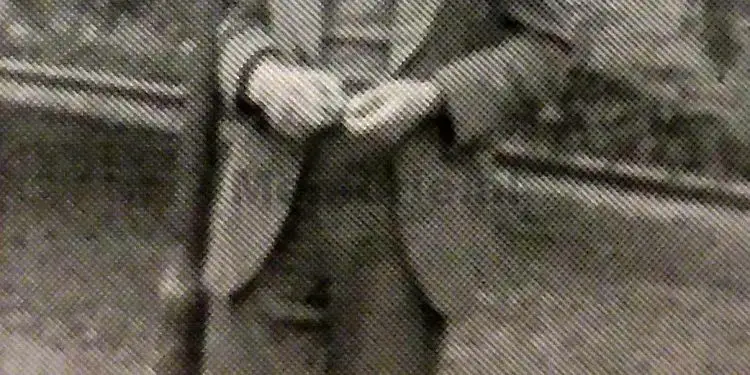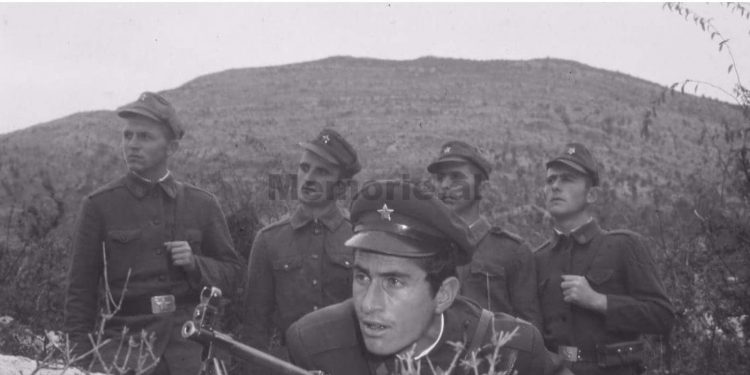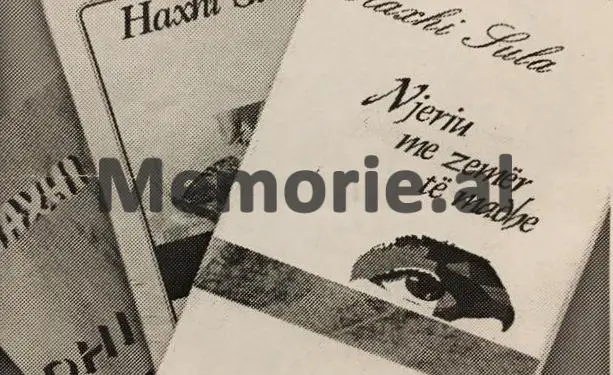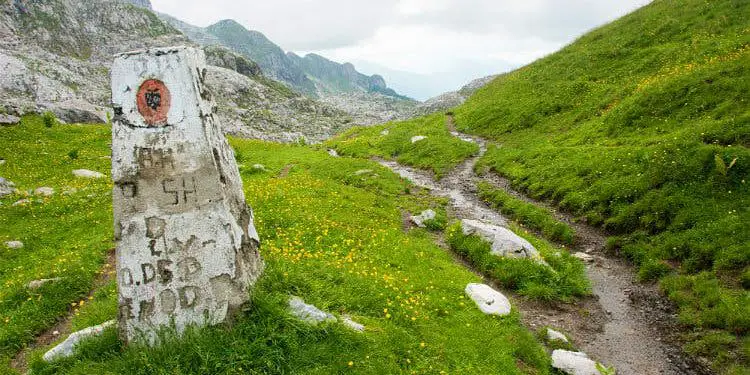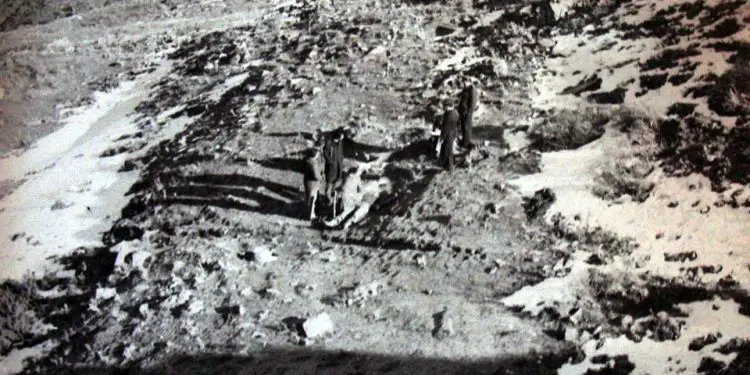Dashnor Kaloçi
Memorie.al publishes the unknown story of Haxhi Sula from Tirana, who in 1975, after a quarrel with Kadri Hazbiu’s son-in-law in the middle of Tirana, took the road towards the Krraba forests in order to escape from Albania. but was captured by soldiers in the village of Pellumbas and sentenced to seven years in prison, sent to serve his sentence in Borsh prison. The rare story of Haxhi Sula’s escape from Borsh prison, where after hitting the soldier on the spot and taking the light machine gun, he left in the direction of the national road where he forcibly forced a ZIS driver and the two took the road to Nivica, where they were surrounded by military and volunteer forces in a major operation led by the Deputy Minister of Internal Affairs, Feçor Shehu, who together with the first secretary of the Party Committee of Saranda, Jashar Menzelxhiu. Haxhiu’s arrest in the village of Nivica, where the forces left him and he fell unconscious, I mentioned after a driver named Foto removed the meat grinder from measuring the car’s oil and put it in the bullet hole, destroying the spleen that was removed. late to the Prison Hospital. Haxhiu’s reinstatement and serving his sentence in Burrel prison from where he was released in 1986, after two amnesties and another attempted escape from the border in 1988 in the village of Skënderbe in Librazhd, where one of his comrades was shot by a border dog, while the other one was shot with a bullet… ?!
“In the stream, I was surrounded by 14 border soldiers led by their officer, Pajtim A. I was constantly firing with light machine guns, but the soldiers were not afraid of my walks. Then another bullet hit me, a finger below the heart. It was the officer who fired, after hiding behind some rocks and pointing accurately at me, I saw two tanks approaching, and above it was a helicopter carrying Feçor Shehu with the first secretary of the Saranda District Party Committee, Jashar Menzelxhiu. The soldiers and civilians of the volunteer forces caught me there and tied me tightly. A driver from Nivica, named Foto, removed the metal oil measuring rod and inserted it deep into the wound of the bullet, which touched my spleen and damaged me. “I don’t have it anymore.” This is how Haxhi Sula recalled his last minutes in freedom, after escaping from Borsh prison in 1975, shortly after he was convicted of “attempted escape” and arrested in the forests of Krraba in the village of Pëllumbas. But who is Haxhi Sula, who is his past, how he was sentenced for the first time when he was 23 years old after a quarrel with Kadri Hazbi’s son-in-law in the middle of Tirana, an event that would change the course of his life to be convicted and re-sentenced several times in the prisons of the communist regime after two attempted escapes from prisons and one from the border ?! Regarding these and other events from his tragic life, Haxhi Sula (or as he is otherwise known after the 1990s as Ylli), considered one of the most horrible communist prisons, along with his wife. Vjollca Giçi Sula, told us shortly before Haxhiu passed away in tragic circumstances in 1997.
The Incident with Kadri Hazbi’s son-in-law
Haxhi Sula’s long history of suffering in communist prisons dates back to around 1975, following an incident in central Tirana that would inevitably change the course of his life. Regarding this, Haxhiu recalled: “I was only 23 years old when my long odyssey towards communist hell began. In the spring of 1975, while I was walking on Qemal Stafa Boulevard in Tirana, a beautiful girl who was learning to ride a bicycle came and crashed into me. I politely reprimanded him, telling him to learn to ride his bike farther and not there, as he would collide with a vehicle. But after a while, Kadri Hazbi’s son-in-law stopped me and hit me. I couldn’t stand it and respond in the same way, but as soon as I found out who he was, I ran away and went to the hills of the lake, and then to the forests of Krraba where I stayed hidden for four days and nights. On the fourth day, thinking that that job would be forgotten, I came down from the forests of Krraba and secretly came to my house in Tirana. There I saw that the forces of the Ministry of Internal Affairs had surrounded the house with four police cars, reminding me that I would return there. The operation to capture me was led by the Deputy Minister of Internal Affairs himself and the Director of State Security, Feçor Shehu, together with Kadri Ismailati, one of the Chiefs of Investigation at the Ministry of Internal Affairs. After what I saw there, at first, I was horrified and did not know what to do, but I gathered myself in a second and immediately set off in the direction of the forests of Elbasan, with the thought of escaping from the border in the area of Librazhd. But in the village of Pëllumbas, I was surrounded by soldiers from a department of the Ministry of Defense who had alerted them after my event. They, with a few long automatic bursts, ordered me to surrender. Since I had been speechless for several days, the forces had left me, and I could not resist the soldiers who immediately captured me and tied me up. One of them said to me, ‘You’ve fallen into the nest of wasps.’ After that, they sent me to Tirana, where they kept me for three months in the Investigator, all alone and with a thin blanket. After the investigation, they kept me in the prison hospital for another six months, treating the wounds they had inflicted on me from the beatings. I was later tried and sentenced to seven years in prison on charges of “attempted escape.” After being held for a week in “Kaushi” of Tirana Prison 313, I was sent to Borshi prison in Saranda “, Haxhiu recalled the incident with the son-in-law of the then Minister of Internal Affairs, who” overcame “him first in prisons of the communist regime.
Escape from Borsh prison
From the first day he arrived at Borsh prison, Haxhi Sulë’s mind was only on how to escape from that camp. Regarding this, Haxhiu recalled: “My mind was full: either to escape or to die there, there was no other way. After I tried and made two attempts, both failed me, but I was not spotted by anyone. The third case came to me when one of the non-commissioned officers ordered me to load the bag of garbage right next to the siege wires. I secretly put some food inside the bag and set off to carry out his order. In those moments in my head I started to grind a lot of things, but the only thing that bothered me, without which I could not take a single step towards the wires, was the gun. I was obsessed and stuck in my head that if I had a machine gun in my hand, there would be no one to stop me from escaping from that camp. I listened to the guard on the terrace and found the opportunity when he approached and hit him on the head to stun him. He fell to the ground but because he was very strong, he got up again and grabbed me by the body. I punched him and threw him into a nearby ditch. As soon as he got there, he pulled out the pistol he had in his belt, while I had previously caught his light machine gun with the chain of bullets inserted into the nest and two others that I had stored in the box. Tears welled up in my eyes as I touched them with joy. He left without knowing where I was going, but only to get as far away as possible. I only had my mind in the direction of the border, there was no other way for me “, testified Haxhi Sula, regarding his dangerous adventure, that of the attempted escape from Borsh prison.
Tracking by soldiers and volunteer detachments
But what happened to Haxhi Sula after his departure from Borsh prison, did he manage to gain freedom? Regarding these, Haxhiu said: “As I had crossed the wires of the outer siege of the prison and was standing with a machine gun in my hand, near me at the moment when some convicts were found, whom the whole camp knew as spies, or collaborators of command, who, with a softer, more pleading voice, called me to surrender. I shot several times in the air over their heads and they lay all over the boat in the mud. From the hail of machine guns, all the air around me carried the smell of gunpowder. It didn’t take long for the siren to sound the alarm in the camp, and the service soldiers from the watchtowers began firing in my direction. I had already given her a run on the main road and there I saw a stopped “Zis” type car, where her driver seems to be trying to eliminate any defects. I approached you and told him to start the car immediately. He was stunned and confused by the words and my appearance with a machine gun in hand. I repeated the words, and he, looking once more at the muzzle of the machine gun, hurried to the steering wheel. The car surprisingly ignited at the moment and he asked me where we were going. I replied three times: to Konispol. He continued: but where ?! I said in a loud voice: towards the border. As if through his teeth he spoke a few words that I could barely understand. It seems to me that he told me: I was taking him by the neck, as he had seven children to feed. I got in the carriage and ordered him to leave immediately. He did as I told him, and as the car flew, I could see myself with a machine gun in my hand and I could barely breathe from the fresh sea air that lay beneath the road. After a while, in front of us on both sides of the road, a group of soldiers appeared who had taken out to follow me. I fired in bursts and they hid under the road. Volunteer troops came out with the soldiers. Everyone was shooting at the car, and its windows and windows were shattered by bullets. As the car began to move forward like a plane, as if the driver had a mind with me, it seemed to me that the road was cracked and from those cracks, soldiers and civilian volunteers were coming out shooting at us. Meanwhile, we took a path towards the forest, and then I thought that the driver would not betray me, because inadvertently, he was connected to me and there was no turning back. At the entrance to the village of Nivica, gunshots and other calls were heard. We entered the forest on the left and there we saw a “Gaz-51” car, full of soldiers. I fired in the direction of the car’s tires and from the pressure it overturned and the soldiers flew from the spoons as if they were toys. We walked a little further and after hearing three gunshots, which were alarming for the villagers, we left the car and told the driver to follow me through the stream “, recalled Haxhi Sula, his dangerous adventure of escaping from Borsh prison with the idea of going to Konispol, where the border was.
Helicopter chase by Feçor Shehu
But what happened to Haxhi Sula and the driver who forced him to follow him from behind in the direction of the border? Regarding this, Haxhiu said: “While I was asking the driver how far the border was from there, he stammered and told me that he had left the children without bread at home. I tried to encourage him to hurry, browsing through his mouth, but always commanding. As we walked, we heard voices very close. Shqferi told me: “You brought both Albanian and Greek soldiers to the border. You will open a war between them. I told him to follow me and then if he wanted to, he could come back. He replied: Where can I drown then ?! “Then hurry with me,” I said, looking at another group of soldiers who had taken up positions on a plot of land in front of us. They shot me and a ricochet bullet hit me in the body and burned me a lot (from this wound they then removed six meters of my intestine). I jumped into the stream and started defending myself by firing indiscriminately. My blood was covering me. The driver fainted or did it himself when he saw me, and I threw water into the stream and he was mentioned. “Let me die,” he begged me, his eyes half-closed. Suddenly I saw soldiers approaching us with their commander, Officer Pajtim A. Positioning them, they fired at me. Another bullet caught me, just below my heart. It was the officer who fired, as he scored accurately from his position. My shoes were covered in blood and my feet were slipping inside. I barely gathered my strength and fired, and once more to scare them. Meanwhile, two tanks were approaching me, while a helicopter was flying overhead, where Feçor Shehu and the First Secretary of the Saranda Party Committee, Jashar Menzelxhiu, were flying. To blow the duff, I spent all the bullets. Nearby I saw a “Zetor” and I approached to ride, but since I had lost a lot of blood, my strength left me and I remained there unconscious. There I was captured by Volunteer soldiers and civilians and tied up. A driver from Nivica, named Foto, removed the oil measuring rod and inserted it deep into the wound hole. He touched my spleen, taking me out of use (I don’t have it anymore). So wounded, powerless, surrendered to the pain, I lay on the ground in a circle of soldiers and civilians looking at me in amazement, as if I were another being, not a human being. Occasionally they threw water at me, and I mentioned the sight of curious faces. Then they tied me tightly and blew me into a “Zetor” filled with wet manure that stuck to my face. At Bamatat village square, I happened to be lying at the feet of Feçor Shehu and Jashar Menzelxhiu. The doctor who was treating me asked to be selected, but they did not grant my request. Then they sent me to Tirana to the Prison Hospital (in the 7th ward), where the doctors signed that I was responsible “, recalled Haxhi Sula, the end of the adventure he took to cross the border in the spring of 1975.
15 years in prison and mysterious murder
After that dangerous adventure, Haxhi Sula was sent to trial in Saranda, where he had committed the “crime” of escaping from the place of serving his sentence. At Qafën e Ballshit, the police officers came down to drink water, untying his hands. As he felt free, he threw himself at a police officer to take his machine gun. During the fight, other police officers hit him from behind and tied him up again. The court initially sentenced him to death and then reduced him to 15 years in prison, as a relative of his was the head of an Internal Affairs Branch, where he would serve a large part of his sentence in Burrell’s dreaded prison. But this was not Haxhiu’s only adventure towards the border. After benefiting from two amnesties granted by Enver Hoxha’s communist regime to some political prisoners in 1982 and 1986, Haxhi Sula was released from prison after serving a sentence of more than eleven years in prison as a political prisoner. After his release from prison, he was able to get a job at the founding of the Enver Hoxha Autotractor Plant in Tirana, where people who had just been released from prison were usually sent for “education”.
Fourth escape attempt
But even though he got a job after being released from prison and found the warmth of his family, Haxhi Sula had his mindset on the border and the “free world”, and every day as he returned from work tired, he thought and made an escape plan. Which would make it a reality a few months later, but unfortunately that attempted escape would be fatal not only for Haxhiu but also for his entire group of seven people who remained bloodied on the clone wires. Haxhiu was in tears and it was impossible for him to tell us that tragic story where his close friends lost their lives and that story was completed by his wife, Vjollca Giçi Sula, who told us: “The time of the Star’s release from prison in 1986, also marks the recognition of our marriage. From the first meetings, Ylli told me about his difficult and adventurous life in prisons. I told him to forget that time, but he did not find it easy because the State Security continued to follow and monitor him even after his release from prison. At that time, wherever we both went, we had a Security man following us every step of the way. As soon as we sat on a bench in the gardens of Lushnja where I lived, or in Tirana when I came to meet as a fiancé we were, he would tell me to turn my head back and show me the man who was following us. The star was very nervous about it and occasionally spoke loudly to the Security people, cursing back and forth. Having no security for his life and being anxious that he would not be arrested by the State Security from time to time, at the end of August 1989, Ylli decided to flee Albania. He had made the escape plan with a close friend named Kujtim Xhaja, who often came to our house and talked at length with Ylli under the shade of the olive trees in the yard. Along with Ylli e Kujtimin, the group that would escape included four other people who were: Agim Sula, (Haxhiu’s younger brother) Bani, their nephew (Haxhiu’s brother’s son, Metit), Petro Pishtari, Ilir Serjani (student) and another person from our neighborhood who unfortunately does not remember his name. Of the entire group of seven, except for Haxhiu’s grandson, Bani, all the others had suffered in the prisons of the communist regime as political prisoners. Agim had served six years in prison and worked at the Meat Factory, Kujtim for nine years, Petro had been imprisoned and interned, and had just been released, while others had spent fewer years in prison. Haxhiu’s plan to escape at the time was for the reason that we had the boy hospitalized, and Ylli thought that the State Security would not think that he would escape at the time he had his son. ill ”, Vjollca recalled, regarding the escape plan of her ex-husband Haxhi Sula and six other tyrants who were part of his group, who, like him, had suffered in prisons as political prisoners.
Detection of the group in the clone
But what was the escape plan of the group led by Haxhi Sula and how was it carried out? Regarding this, Vjollca Sula testifies: “At the time when Haxhiu and the other six members of the group finally decided to flee and set the date when they would leave for the border, they swore that they would not plan for them. they did not even show the closest people to the families. But Haxhiu was the only one who told me, giving me the instructions on how to act if their escape plan failed. The last meeting and departure to Librazhd took place from our home on the morning of September 1988. The announcement of the day of departure was made only one night in advance, in order to eliminate any doubt about each of the members of the group. They left by train and as Haxhiu told me when they landed in Librazhd, they split into two groups and left the meeting place in the village of Rrajcë, which is only a few km away. east of the city of Prrenjas. Haxhiu and his comrades had decided to flee on Sunday because the border soldiers were more careless. After meeting in the village of Rrajcë, they set off in the direction of the state border above that village, in the sector called Skënderbe. In that area, which is very close to the border, they arrived at about three-thirty in the morning. When they got there, Haxhiu pulled out the pliers he had taken with him to cut the clone wires, and the moment they cut them, Petro Pishtari’s jacket sleeve stuck to the current wire and the clone’s signal wire giving the signal to the post office. closest to border violations. Immediately after the signal was given, an alarm was sounded and from the two border posts of Rrajcë-Sutaj and Rrajcë-Skëndërbe, about 60 soldiers were divided into two groups. They carried out their complete siege and for about two hours without a break fired with automatic weapons without stopping the fire for a moment “, Vjollca Sula recalls, regarding the discovery of the group led by her husband, Haxhiu, there on the clone wires in Skanderbeg sector of Rrajcë village of Librazhd.
Kujtim’s murder, Ilirjan wounded by border dog
But what happened next to the group of seven Tirana boys there on the thorny strings of the clone on the state border, where they were just a few steps away from the free world they had dreamed of for years? In this regard, Vjollca Sula recounts the whole event that her ex-husband Haxhiu told her. “About two hours after they were under the fire of the border guards’ automatic weapons, none of them moved from the place, but they all clung as hard as possible behind the stones and rocks. At one point around 05:30 when the sun was setting, Ilirjan Serjani was taken on foot to cross the clone, but he was caught alive by the border guards. One of the soldiers tied him up with wire and another put a hot automatic rifle in his mouth and said, “Are you going to die from this, or from the border dog?” Ilirjani, terrified, replied: From the dog. After that, the border guards tracked down the large border dog, who jumped on it and, after laying it on the ground, began to tear it apart. At that time, Haxhiu, who was a few steps away, covered his eyes with his hands because he could not see his friend screaming from the grunts of the dog that bit him incessantly. As he watched Ilirjani drowned in blood and with pieces of meat and clothes on the dog’s teeth, he bit his lip hard enough to bleed. At that time, from the alarm that was given, almost the whole village of Rrajcë had gathered there, oriented by the dog’s howls. Seeing Ilirjani under the dog’s teeth, Haxhiu’s brother, Agimi, together with Kujtim Xhaja, got up and decided to surrender. But in those moments, two automatic cartridges were fired at them, and Kujtim was left dead on the spot, with about 60 bullets in his body, and his blood flowed as if he had been sawed off. As Haxhiu told me, in a few minutes, Kujtim’s dead body turned yellow, white, and then blue. At the moment when Kujtim was killed, Haxhiu stood up and with a small knife in his hand approached to hit the dog that did not release Ilirjani, but at that moment some soldiers jumped on him and tied him with barbed wire. hitting him with wood where they could. After Hajji was captured, the others, tied with barbed wire to their hands and feet, boarded a military vehicle that had come with other soldiers to reinforce the border. After arranging them all in the body of the car, together with Ilirjani, who did not understand if he was alive or dead, Kujtim Xhaja’s body was tied up by soldiers on the back of the car and dragged on a large part of the road under the watchful eye of fshatravëve. His body was then put in a car and placed at the feet of his comrades, who kept him tied to a cart. They were then taken to the Librazhd Branch of the Interior, where they were brutally tortured for more than a month. After a month, they were brought to trial and sentenced to “high treason”, with sentences ranging from five years and below, “concludes her gruesome testimony, Vjollca Giçi Sula, regarding the tragic event that took place in September 1989. when seven Tirana boys who had previously suffered in the prisons of the communist regime took the road to the clone where they were bled by soldiers’ bullets and border dogs, who kept “the paradise of Enver Hoxha’s socialism” intact.
Release from prison on March 28, 1991
Haxhi Sula was one of the last political prisoners to be released on March 28, 1991, from Spaç prison, after he organized a hunger strike on the terrace of one of the buildings in that prison, together with David Luma, Paulin Bërdicën and Gjin Shllaku… After the prison, Haxhiu returned to Tirana with his family, his wife, Vjollca and his young daughter, and began to rebuild his life from scratch. He had a great passion for poetry and tried to write not without success, managing to publish several books, with poetry and memoirs from the prisons of the communist regime where he had spent almost 15 years of his life at his best age. But, in March 1997, as the big riots started, a mysterious hand shot him to death, right next to his house at “Oxhaku”, near the United School./Memorie.al




